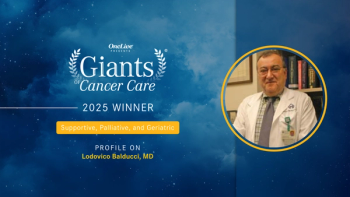
Second-Line Treatment Selection in RCC
For High-Definition, Click
Ascertaining progression and knowing when to switch therapies can often be challenging when treating patients with renal cell carcinoma (RCC). While the use of RECIST criteria helps standardize decision-making regarding when to switch therapies in clinical trials, it is less commonly used in clinical practice, Brian Rini, MD, comments. He notes that it is best to maintain patients on first-line therapy as long as possible, adjusting the dose or the schedule as needed. Janice Dutcher, MD, agrees that physicians generally know when a drug is no longer helping a patient and when they should try other options. With some patients, progression is slow enough that it warrants adjustments in dosing to try to improve response. With other patients, progression occurs more rapidly, warranting a switch.
Charles Henderson, MD, believes that response to first-line therapy in RCC can help guide treatment selection for second-line therapy. Henderson also considers interventions, such as local surgery or radiation, which may allow patients to continue treatment with a first-line TKI. If these options are not feasible, Henderson will consider the individual’s course of therapy with the original TKI. If a patient has a fairly stable disease course while receiving a first-line angiogenesis inhibitor for at least 8 months, a second-line TKI, such as axitinib, is usually initiated in the second-line setting. However, if an individual’s disease progresses more rapidly (eg, 4 months), everolimus may be a better second-line option.
Daniel Heng, MD, notes that the common assumption that a patient’s response to first-line therapy should influence the choice of second-line therapy is not evidence-based. A clinical trial conducted by the International Metastatic Renal Cell Carcinoma Database Consortium showed that individuals who fared poorly on first-line therapy with a VEGF inhibitor did not necessarily have poor outcomes when treated with a second VEGF inhibitor. Moreover, it also could not be predicted that those who performed well on their first VEGF inhibitor would benefit from a second VEGF inhibitor. Heng and Rini agree that the second-line VEGF and mTOR agents should not be selected based on how individuals performed on their first-line therapies. Rini points out that those who had primary progression on first-line therapy may have been under dosed.



































